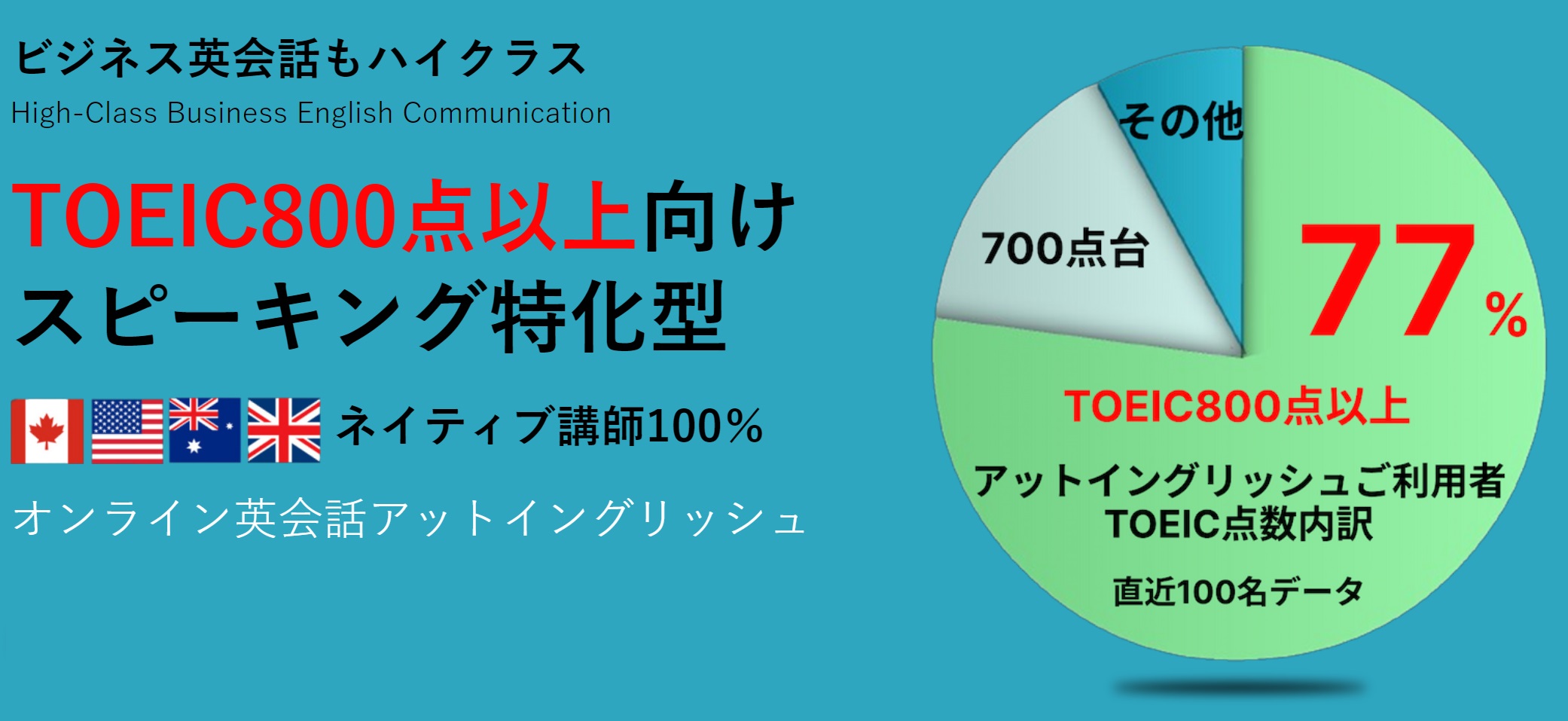今回は、アットイングリッシュで扱った 2023年のニュース、「福島第一原発の処理水放出と中国による日本の水産物輸入禁止」についてのディスカッションを元に、英語の基礎用語とネイティブの英語表現をご紹介していきます。
時事問題に関する英語での議論を通して、状況説明、意見の表明、相手の意見の受けとめ、フィードバックの提供など、英語による会議での発言やプレゼンテーション、ファシリテーションの練習にお役立てください。
目次
- 1 福島第一原発の処理水海洋放出とは?
- 2 福島第一原発の処理水放出に関する基本英単語と英語表現
- 3 処理水と汚染水の違いを英語で説明
- 4 処理水放出問題についての英字新聞記事を要約
- 5 Q. この記事で使われている”economic coercion(経済的威圧)”の意味は?
- 6 Q. 中国の人々がIAEA(International Atomic Energy Agency) – 国際原子力機関の報告書を信じないのはなぜだと思いますか?
- 7 Q. この状況に対して、日本政府はどのような措置を取るべきだと思いますか?
- 8 Q. 5年後、この問題はどうなっていると思いますか?
- 9 Q. 多くの科学的根拠にも関わらず、処理水を「核汚染水」と決めつけることは、世界の原子力に対する認識にどのような影響を与えると考えますか?
福島第一原発の処理水海洋放出とは?
2023年8月24日、東京電力は、2011年の東日本大震災で被災した東京電力福島第一原子力発電所から出た処理水の海洋放出を開始しました。
東京電力は震災とそれによる原発事故以来、この原発の燃料棒を冷却するために水をくみ上げ続けています。そのため毎日、汚染水が発生しており、これまでに1000基以上のタンクが満杯になっています。
日本は、安全な廃炉作業用新設備を建設するため、これらのタンクが置かれてきた土地が必要と説明。IAEAが承認して、汚染水から放射性物質を出来る限り除去した処理水(トリチウムを水から除去するのが難しい為、トリチウムを水で希釈している)を徐々に太平洋に放出しています。
福島第一原発の処理水放出に関する基本英単語と英語表現
処理水放出問題についての一般用語を英語で表現
Fukushima nuclear plant – 福島原子力発電所
Fukushima Daiichi Nuclear Power Plant – 福島第一原子力発電所
Pacific Ocean – 太平洋
Chinese Foreign Ministry Spokesperson – 中国外務省報道官
処理水放出のプロセスを説明する際に使える英語
Releasing treated radioactive water – 処理済み放射性水の放出
Discharge of treated waste water – 処理済み排水の放出
Discharge over the next 30 years – 次の30年にわたって放出される
Decommissioning the plant – 発電所の廃止
Filtering and diluting – 濾過および希釈
Evacuate from the area – その地域から避難する
Approved the plan – 計画を承認した
Monitor levels of radiation – 放射線量をモニタリングする
処理水放出への反応や意見に関連する英語
Opposition from its neighbours – 近隣諸国からの反対
Alarm across Asia and the Pacific – アジアと太平洋地域での警戒
Protestso – 抗議者
Uproar in neighbouring countries – 近隣諸国で騒ぎ
Endorsed the plan – 計画を承認
処理水問題に関係する組織・団体や団体の英語名
Tepco – 東京電力
IAEA – 国際原子力機関(IAEA:International Atomic Energy Agency)
International Atomic Energy Agency – 国際原子力機関
UN’s nuclear watchdog – 国連の原子力監視機関
Environmental activist group Greenpeace – 環境活動団体グリーンピース
Pacific Islands Forum – 太平洋諸島フォーラム
処理水をめぐる国際関係を語る際に使える英語
China – 中国
South Korea – 韓国
Japan – 日本
Ban on seafood imports – 海産物輸入の禁止
Block all such imports – これらの輸入を全てブロックする
A longstanding ban on some Japanese seafood – 一部の日本の海産物に対する長期の禁止令
Import curbs on some Japanese food products – 一部の日本食品への輸入制限
環境・健康関連の英語
Contaminated water – 汚染水
Radioactive substances tritium and carbon-14 – 放射性物質トリチウムと炭素14
Dilute it with seawater – 海水で薄める
Sustainable long-term solution – 持続可能な長期的解決策
Negligible impact on the environment – 環境への軽微な影響
Radiation doses – 放射線量
Safety standards – 安全基準
Lack of transparency – 透明性の欠如
Marine environment, food safety and public health – 海洋環境、食品安全、公衆衛生
処理水と汚染水の違いを英語で説明
“Contaminated water” and “ALPS treated water” are different. Water that is contaminated contains harmful substances, in this case, radioactive materials generated by the nuclear accident.
「汚染水」と「ALPSによつ処理水」とは違うものです。汚染水とは有害物質が含まれている水で、この場合は原発事故によって発生した放射性物質のことです。
ALPS-treated water has been purified to meet the regulatory standards for environmental release. The only radioactive substance left is tritium, which is difficult to remove.
ALPS処理水は、環境放出に関する規制基準を満たすように浄化されています。除去するのが難しい放射性物質はトリチウムだけは残ります。
Tritium can affect the human body’s red blood cells, but only if very large amounts are ingested. For this reason, nuclear facilities around the world consider it safe to release treated water into the natural environment where it becomes very diluted.
トリチウムは人体の赤血球に影響を与える可能性がありますが、それは非常に大量に摂取した場合のみです。このため、世界中の原子力施設は、処理水を自然環境に放出しても、希釈されるため安全だと考えています。
処理水放出問題についての英字新聞記事を要約
This article discusses the negative impact on Japan’s fishing industry as a result of the Chinese government’s recent decision to place a ban on the importation of all Japanese marine products.
この記事は、中国政府が最近行った、日本の水産物全般への輸入規制と、その結果が日本の漁業に及ぼす影響について述べています。
China’s position is that releasing treated water from Fukushima’s damaged nuclear power plant poses a serious threat to the environment and anyone who eats seafood caught in that area, despite the preponderance of scientific evidence to the contrary.
中国の立場は、損傷した福島原子力発電所から処理水を放出することは、それに反する多数の科学的証拠がにもかかわらず、環境と、その地域で獲れた魚介類を食べる人に深刻な脅威をもたらすというものです。
Q. この記事で使われている”economic coercion(経済的威圧)”の意味は?
1. In this case, “economic coercion” refers to the pressure that China is putting on Japan by refusing to allow food imports.
この場合、「経済的威圧」とは、中国が日本からの食品の輸入を拒否することによって日本に与えている圧力のことです。
(いいね: economic coercion)
(いいね: the pressure that China is putting on Japan)
2. This is going to cause a lot of problems for Japan’s fishing industry, which is heavily dependent on its ability to export seafood to China.
これは、中国への魚介類の輸出に大きく依存している日本の漁業にとって大きな問題となるでしょう。
(いいね: This is going to cause a lot of problems for __)
(いいね: __ is heavily dependent on __)
3. Given the rising tensions between China and the United States, this is most likely meant to force Japan to adopt a more China-friendly political stance, which the hope will damage the strong relationship between Japan and the United States.
中国とアメリカとの間の緊張が高まる中で、これはおそらく、日本に対して、より中国寄りの政治的立場を採るよう強いる意図があるものでしょう。それによって、日本とアメリカとの強固な連携にダメージを与えることを期待しているのでしょう。
(いいね: Given)
(いいね: the rising tensions between China and the United States)
(いいね: this is most likely meant to,)
4. In the context of this article, ‘economic coercion’ refers to the Chinese government placing economic pressure on Japan’s government by forcing them to find new markets for twenty percent of the Japanese marine exports.
この記事の文脈での「経済的威圧」とは、日本の海産物輸出の20%の新しい市場を見つけることを強いることにより、中国政府が日本政府に経済的圧力をかけることを意味します。
(いいね: Chinese government placing economic pressure on Japan’s government)
5. The Chinese government hopes their decision will make the Japanese government more receptive when negotiating with them on other matters of international importance.
中国政府は、この決定によって、他の国際的に重要な問題に関する交渉で、日本政府がより軟化することを望んでいます。
(いいね: more receptive)
(いいね: other matters of international importance)
Q. 中国の人々がIAEA(International Atomic Energy Agency) – 国際原子力機関の報告書を信じないのはなぜだと思いますか?
1. It’s important to remember that most people in China don’t have access to uncensored world news.
中国のほとんどの人々は、検閲無しの世界のニュースにアクセスできないことを忘れてはいけません。
(いいね: have access to __)
(いいね: uncensored world news)
2. They’re forced to rely on their government and its media outlets for news reports. This has probably resulted in a lot of skewed information, fake news, and outright lies in Chinese media.
中国国民は、その政府とそのメディアに報道を頼る以外にありません。そのために、中国のメディアでは多くの偏向報道、フェイクニュース、そして露骨な嘘が生じている可能性があります。
(いいね: They’re forced to rely on __)
(いいね: This has probably resulted in __)
3. Some people in China are probably very suspicious of it and worry that it’s not accurate.
中国の人達の中には、報道を疑い、正確でないのではと危惧している人もいるでしょう。
(いいね: Some people in China are probably very suspicious of it)
4. I believe that Chinese citizens don’t trust the International Atomic Energy Agency report simply because China’s government tightly controls the media and restricts internet access to outside sources of information, which makes it easy for their government to ‘shape the narrative’ of reports according to what they believe is in the Chinese government’s best interests.
中国国民が国際原子力機関(IAEA)の報告書を信じないのは、単に中国政府がメディアを厳しく統制し、外部の情報源へのインターネットアクセスを制限しているためで、中国政府の利益になると彼らが考える内容に従って『物語』を作りやすいからだと思います。
(いいね: simply because)
(いいね: China’s government tightly controls the media)
(いいね: __ restricts internet access to outside sources of information)
(いいね: shape the narrative)
(いいね: the Chinese government’s best interests)
Q. この状況に対して、日本政府はどのような措置を取るべきだと思いますか?
1. I’m not sure whether it’s possible for the Japanese government to repair the relationship with China without making some major concessions that might make Japan’s situation worse, in the future.
日本政府が、将来的に日本の状況を悪化させることになるかもしれない大きな譲歩をすることなく、中国との関係を修復することが出来るのかは、分かりません。
(いいね: I’m not sure whether it’s possible __)
(いいね: to repair the relationship with China)
(いいね: without making some major concessions)
2. If possible, the best solution might be to find other trading partners who are willing to take on larger amounts of Japanese food exports. Some possibilities include Thailand, Australia, Vietnam or even the United States and Canada. North America might do this just to undermine China’s influence in the region.
可能なら、日本の食品輸出を喜んで輸入してくれる他の貿易相手国を見つけることが最善の解決策かもしれません。タイ、オーストラリア、ベトナム、あるいはアメリカやカナダなどは可能かもしれません。北米なら、この地域における中国の影響力を弱めるためだけに、そうするかもしれません。
(いいね: the best solution might be __)
(いいね: __ are willing to take on larger amounts of Japanese food)
(いいね: to undermine China’s influence in the region)
3. The Japanese government should continue to publicize the unfairness of China’s decision, seek the help of whatever international trade organizations they can appeal to, and assist the Japanese fishing industry in identifying new markets for their products.
日本政府は、中国の決定の不当さを発信し続け、訴えられる国際貿易団体に助けを求めたり、日本の漁業が新たな市場を開拓できるよう支援すべきです。
(いいね: to publicize the unfairness of China’s decision)
(いいね: seek the help)
(いいね: identifying new markets for their products)
4. Japan’s government should also consider potential countermeasures they could employ to induce the Chinese government to remove the ban, although this could lead to further deterioration of relations between the two countries.
日本政府はまた、中国政府に禁輸措置を撤廃するよう促す対抗措置の可能性を模索すべきですが、これは両国関係のさらなる悪化に繋がってしまうかもしれません。
(いいね: potential countermeasures)
(いいね: to induce the Chinese government to remove the ban)
(いいね: further deterioration of relations)
Q. 5年後、この問題はどうなっていると思いますか?
1. I actually did some research, and it seems like China’s own food situation is not very secure or stable. China’s population is about 1.4 billion people, and the country does not produce enough food to sustain itself, meaning that it needs to rely on imports to meet some of its needs.
実は少し調べてみたのですが、中国の食糧事情はあまり安全かつ安定してはいないようです。中国の人口は約14億人ですが、自給できるほどの食料を生産しておらず、必要な食料の一部を輸入に頼らざるを得ない状況です。
(いいね: I actually did some research,)
(いいね: the country does not produce enough food to sustain itself)
(いいね: it needs to rely on imports to meet some of its needs)
2. Given the amount of pollution in China’s own coastal waters, and the amount of arable land they’ve destroyed through industrialization, I think that they will need to allow Japanese imports in the next five years, unless they can find other trading partners.
中国自体が行っている沿岸海域での汚染の規模と、工業化によって破壊された耕地に適した土地の量を考えると、他の貿易パートナーを見つけられない限り、5年の間には日本の輸入を許可する必要があると思います。
(いいね: Given the amount of pollution in China’s own coastal waters)
(いいね: the amount of arable land)
3. It’s difficult to predict what might happen over the next five years, as there are so many possible variables involved, but I do believe that China’s behaviour will further underscore their complete disregard for international treaties and fair practices.
今後5年間に何が起こるかを予測するのは、多くの不確定要素が絡んでいて困難ですが、中国は更に、国際条約や公正な慣行を完全に無視することが顕著になってくるだろうと思います。
(いいね: It’s difficult to predict what might happen)
(いいね: there are so many possible variables involved,)
(いいね: identifying new markets for their products)
4. Hopefully, many countries will direct their trade and commerce away from dependence on China, and act in unison to force improvements in how China’s government behaves in a number of different areas.
願わくば、多くの国々が貿易と通商において中国への依存から距離を置くようになり、さまざまな分野で中国政府の振る舞いを改善させるよう、一致団結して行動してほしいです。
(いいね: many countries will direct their trade and commerce away from dependence on China)
(いいね: act in unison)
Q. 多くの科学的根拠にも関わらず、処理水を「核汚染水」と決めつけることは、世界の原子力に対する認識にどのような影響を与えると考えますか?
1. The words “nuclear contaminated” immediately make people think of toxic and dangerous radioactive waste, and this will have a big impact on what they think about nuclear energy.
「核汚染」という言葉を聞くと、人々はすぐに有毒で危険な放射性廃棄物を思い浮かべ、これは原子力発電に対するイメージに大きなインパクトを与えます。
(いいね: this will have a big impact on __)
2. The unfortunate fact is that many people don’t have the time or the inclination to do their own research into nuclear power, and they rely on the media to tell them what the media wants them to know.
残念なことに、多くの人々は原子力について自分で調べる時間も気力もなく、メディアに頼って、メディアが彼らに知って欲しいと思うことを知るというのが現実です。
(いいね: The unfortunate fact is that __)
(いいね: to do their own research into nuclear power)
(いいね: they rely on the media to tell them what the media wants them to know)
3. As a result, they’re only familiar with these words in relation to high-profile nuclear accidents, and they don’t understand the safety precautions that are normally taken when managing nuclear facilities and treating waste water.
その結果、注目される原発事故に関連した言葉ばかり知るようになり、原子力施設を管理し、廃水を処理する際に通常取られている安全のための予防策について理解しなくなります。
(いいね: As a result,)
(いいね: they’re only familiar wit __)
(いいね: the safety precautions that are normally taken)
4. The Chinese government’s characterization of the treated water as nuclear-contamination of the ocean will undermine support for the usage of nuclear energy in future, and distract discussion of more important issues related to this source of power.
中国政府が処理水を海洋の核汚染と決めつけたことは、今後の原子力エネルギー利用への支持を損なうことになり、このエネルギー源に関するより重要な問題の議論を邪魔することになります。
(いいね: undermine support for the usage of nuclear energy)
(いいね: distract discussion of more important issues)
5. Governments need to devote more time and energy to providing safe, long-term storage of nuclear waste, or its neutralization, which has never been achieved in the seventy plus years history of the industry.
政府は、核廃棄物の安全で長期的な貯蔵や、70年以上の原子力産業の歴史の中でいまだ為されない中和に、より多くの時間とエネルギーを割く必要があります。
(いいね: __ need to devote more time and energy to __)
(いいね: , which has never been achieved in the seventy plus years history)
処理水問題関連の情報:
経済産業省のページ
みんなで知ろう。考えよう。ALPS処理水のこと










